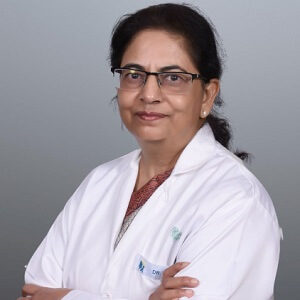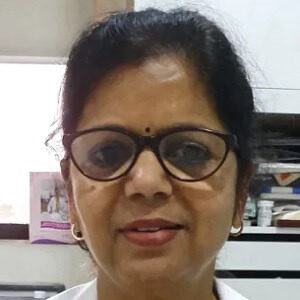Best Doctors in India for Pap Smear Test
- Top Obstetrician & Gynaecologist | Apollo Hospital, New Delhi, India
- 22+ Years Experience
- Indraprastha Apollo Hospital, New Delhi
Profile Highlights:
- Dr. Sohani Verma is a well-known Gynecologist and Obstetrician in India, with approximately 22 years of experience in numerous treatments in these disciplines. Dr. Verma serves as a senior consultant at Indraprastha Apollo Hospitals.
- She specializes in infertility and IVF treatments, and she also founded a sperm bank in the hospital in 2002. She has 22 years of IVF and infertility experience in the UK and India.
- Dr. Sohani Verma worked as the Academic Coordinator for the Department of Obstetrics and Gynaecology at Indraprastha Apollo Hospitals in New Delhi.
- Obstetrician & Gynaecologist, Gurugram, India
- Over 43 years’ experience
- Fortis Memorial Research Institute
Profile Highlights:
- Dr. Suneeta Mittal is a distinguished Senior Director and Head of the Department of Obstetrics & Gynaecology at Fortis Gurgaon, with over 43 years of exemplary experience in the field.
- Her academic background is equally impressive, holding an MBBS and an MD in Obstetrics & Gynaecology, along with several prestigious fellowships, including FRCOG and FICOG.
- Recognized as one of the leading gynaecologists in Delhi and Gurgaon, Dr. Mittal’s expertise is widely sought after by both government bodies and international agencies.
- Top Obstetrician & Gynaecologist | Apollo Hospital, New Delhi, India
- 35+ Years Experience
- Indraprastha Apollo Hospital, New Delhi
Profile Highlights:
- Dr. Sushma Prasad Sinha is one of the top Gynaecologists and Obstetricians in India, having over 35 years of experience. She is primarily a well-known name in infertility & IVF with an unrivalled success rate.
- Dr. Sinha specialises in the ovarian cyst, fibroid, endometriosis, and ablation laparoscopic procedures; hysteroscopic surgeries, vaginal surgeries, tubal reconstruction, Colposcopy, loop cone cervical biopsies, and fertility preservation surgeries.
- She works in Indraprastha Apollo Hospital as an obstetrician and gynaecologist.
- Dr. Sushma Prasad Sinha has also written articles for many medical publications and a book chapter titled “Effective Approach to Basic Evaluation of Subfertile Couples.”
- Top Obstetrician & Gynaecologist | Max Hospital, Saket, New Delhi, India
- 31+ Years Experience
- Max Super Specialty Hospital, Saket, New Delhi
Profile Highlights:
- Dr. Usha Kumar currently serves as the Principal Consultant and Gynaecological Endoscopic Surgeon at Max Smart Super Speciality Hospital
- Dr. Usha M Kumar is a distinguished Associate Director in Obstetrics and Gynaecology, with over 31 years of extensive experience in the field.
- Dr. Usha M Kumar holds an MBBS degree and an MS in Obstetrics and Gynaecology from Lady Hardinge Medical College, Delhi. She further pursued advanced training with a Diploma in Advanced Endoscopic Surgeries in Germany and a Certificate in Laparoscopic Oncology Surgery.
- Obstetrician & Gynaecologist, Gurugram, India
- Over 40 years’ experience
- Artemis Hospital, Gurgaon
Profile Highlights:
- Dr. Veena Bhat is a senior obstetrician and gynecologist. Her clinical interest lies in Endoscopic management of infertility, Adolescent Gynecology, High-risk pregnancy, Menopausal health, and Minimal invasive surgery in Gynae.
- The doctor performs Gynecological Endoscopy, both Laparoscopy & open (Hysteroscopy); Laparotomy, Endometriosis Surgery, Ovarian Cystectomy, and myomectomy with decent success.
Best Hospitals in India for Pap Smear Test
Hospital Highlights:
- Apollo Hospitals is a private healthcare group in India, with its headquarters based in Chennai. Established in 1983 by Dr. Prathap C. Reddy, the group offers a wide range of medical treatments and services across various specialties.
- It is renowned for emphasizing innovation and utilizing cutting-edge medical technologies into patient treatment.
- Known as India’s first corporate hospital, Apollo Hospitals is often credited for pioneering the private healthcare revolution in the country.
- With clinics and hospitals located all throughout India, Apollo Hospitals is a nationwide healthcare organization. Its presence can also be found in foreign countries.
- Preventive health examinations, medical and surgical treatment, and diagnostic centres are just a few of the services that the Apollo group provides.
- The group has several centres of expertise, including Cardiac Sciences, Neurosciences, Orthopedics, Emergency Care, Cancer Care, and Organ Transplantation.
- City: Chennai, India
Hospital Highlights:
- RIMC is a multi-specialty hospital in a sprawling area of 36 acres located in Chromepet, Chennai, Tamil Nadu, India.
- The facility has 450 beds including 130 critical care beds, 9 operating rooms, modern reference laboratories and radiology services, and is conveniently located near road, rail and air transportation.
- RIMC is led and managed by world-renowned physicians committed to healthcare.
- RIMC offers the broadest range of clinical care, education, and research. The hospital offers state-of-the-art technology and modern treatment facilities designed to provide health care at an affordable cost.
- Rela Institute is driven by patient needs, comfort and confidence.
- City: New Delhi, India
Hospital Highlights:
- Fortis Hospital in Shalimar Bagh is a multi-super specialty hospital that strives to provide world-class patient care by leaving no stone unturned.
- Fortis, Shalimar Bagh, with 262 beds and a 7.34-acre footprint, provides the best level of medical care through its team of doctors, nurses, technicians, and management professionals.
- City: Bengaluru, India
Hospital Highlights:
- Established in 2007, the Apollo Hospitals Bangalore is a 300-bed multispecialty hospital situated in Bannerghatta Road, Bangalore.
- Equipped with the state-of-the-art technology, it is a leading hospital dedicated to providing healthcare needs to patients with compassion and expertise.
- It is the first hospital to have completed the highest number of Robot Assisted Heart Surgeries in India.
- Over the years, it has successfully conducted some of the rarest medical procedures such as spinal angiolipoma excision, autologous chondrocyte implantations, and tibial tuberosity shift with MPSL reconstruction.
- The Apollo Hospitals Bangalore has the reputation of performing the greatest series of airway stents in the country.
- Additionally, the hospital is known for providing comprehensive treatment in specialties such as gastroenterology, urology, gynecology, oncology, colorectal surgery, etc.
- The “The Minimal Access Surgery Centre” (MASC), one of Apollo Hospitals, Bangalore’s premier Centres of Excellence, is devoted to the use of minimally invasive surgical procedures.
- In 2013, THE WEEK-A C Nielsen, Best Hospital Survey ranked Apollo Hospitals Bangalore as the 2nd best multi-speciality hospital in Bangalore.
- City: Mumbai, India
Hospital Highlights:
- Gleneagles Global Hospital The 450-bed facility comprises of 17-stories, housing state-of-the-art infrastructure, and advanced medical care facilities.
- The hospital offers end-to-end clinical, surgical, and diagnostic services. It is equipped with a team of eminent medical professionals aided by qualified nurses and medical staff
- The Hospital offers advanced Endoscopic procedures, Hepatobiliary and Liver Surgeries, Surgical and Medical Gastroenterology, Bariatric Surgery, and Robotic surgery.
- The hospital is a center of excellence for Orthopedics, Joint Replacement, Knee Replacement, and Hip Replacement surgery.
- City: Hyderabad, India
Hospital Highlights:
- CARE Hospitals were established in the year 2000, by CARE Group.
- The multispecialty hospital has 435 beds, including 120 critical care beds, with an annual inflow of 180000 outpatients and 16,000 in-patients.
- The hospital provides specialty medical services in Cardiology, Cardiothoracic Surgery, Pediatric Cardiology, Pediatric Cardiothoracic Surgery, Neurology, Neurosurgery, Nephrology, and Urology.
- The hospital has the first dual source, 128 slice CT scanner (for high precision cardiac imaging) – the first of its kind in south India.
- The hospital offers a wide range of accommodation facilities for the convenience of its varied patient base, ranging from general wards to super deluxe rooms.
- City: Mumbai, India
Hospital Highlights:
- Fortis Hospital in Mulund is a 315-bed multi-speciality tertiary care hospital with five JCI accreditations that offers a wide variety of diagnostic and treatment services. The Fortis Hospital in Mulund delivers patient-centred treatment with cutting-edge technology, highly skilled and experienced surgeons, and paramedical staff.
- This institution houses Maharashtra’s largest multi-organ transplant centre. It is also the first heart transplant centre in western India to conduct 100 or more consecutive heart transplants in under four years. It is the only hospital in the city to have multi-organ transplants and has handled the youngest patient for angioplasty. Fortis Hospital Mulund now boasts the first advanced surgical robot in central Mumbai.
- Cardiology and heart surgery, urology, nephrology, neurosciences, orthopaedics, digestive care, emergency and critical care, and maternity care are among the services provided by the hospital.
- City: New Delhi, India
Hospital Highlights:
- Manipal Hospitals, Dwarka, is a super-specialty hospital in Dwarka, New Delhi, which is a part of Manipal Hospitals Group.
- The hospital aims to provide the best treatment on par with international standards at a fraction of the cost.
- Equipped with 380 beds, the hospital is also one of the new age hospitals which are equipped fully with state-of-the-art infrastructure, cutting-edge technology as well as the latest and advanced clinical practices. The hospital also has 13 modular Operation theatres with 118 beds which are solely meant for critical care.
- The hospital comprises internationally acclaimed doctors and highly professional and experienced hospital and medical staff who are able to provide preventive, therapeutic, and diagnostic services all under one roof.
- City: Chennai, India
Hospital Highlights:
- Located in Chennai, India, MGM Healthcare is a top multispecialty hospital that provides all medical services under one roof.
- Since its founding in 2019, MGM Healthcare has quickly become a leading national referral centre, creating several innovative flagship initiatives.
- MGM Healthcare combines next-generation medical and digital technologies to provide better patient results.
- With 12 centres of excellence, more than 400 inpatient beds, 100 intensive care unit beds, and 24/7 emergency care, MGM Healthcare leaves no chance in redefining the patient experience in Chennai.
- MGM Healthcare boasts 250+ expert doctors across 30+ departments, including Cardiology, Pulmonology, Neurology, Obstetrics & Gynaecology, and more.
- They house 12 specialized Centres of Excellence, including Neurosciences, Orthopaedics, and Multi-Organ Transplantation.
- Their team of doctors, nurses, and paramedics works together to give every patient individualized treatment.
Hospital Highlights:
- Lilavati Hospital & Research Centre is India’s premier multi-speciality tertiary care hospital and has been recognised as a global medical excellence centre.
- Lilavati Hospital & Research Centre has built an unrivalled level of trust with its patients over the years, thanks to a solid foundation that comprises cutting-edge facilities, the best medical competence, research, education, and charity endeavours.
- The hospital is quite proud of the fact that it now serves patients from all kinds of backgrounds, not just from the United States but from all around the world.
- The hospital has a total of 323 beds, one of the largest Intensive Care Units (ICUs), 12 Operation Theatres with modern amenities, over 300 consultants, and almost 1,800 personnel.
Pap Smear
Pap smear also termed as Pap test, is a procedure for testing cervical cancer in women. It involves collecting cells from the cervix, which is the lower narrow end of the uterus, which lies at the top of the vagina.
Detecting the cancer early on, with a Pap smear, gives one a greater chance of curing it. This procedure can also detect changes in your cervical cells that may suggest cancer developing in the near future. A Pap smear can easily help you detect any abnormal cells, which is your first step in stopping the possible development of cervical cancer.
Purpose
The purpose of Pap smear is to screen for cervical cancer.
Regular Pap smears are recommended for women every three years from the age of 21. For women who are HIV-positive or those having a weakened immune system from chemotherapy or organ transplant, it is needed more frequently.
This procedure is usually done in conjunction with a pelvic exam. For women who are older than the age of 30, the Pap test can be combined with a test for human Papillomavirus (HPV) – a common sexually transmitted infection that can lead to cause cervical cancer. The HPV test may be done instead of a Pap smear in a few cases.
Women who are aged 30 and older may consider Pap testing every five years if the procedure is combined with HPV testing. Or they can also consider HPV testing instead of the Pap test.
Your doctor may recommend more frequent Pap smears, regardless of your age, if you have certain risk factors such as:
- A Pap smear that showed precancerous cells or a diagnosis of cervical cancer
- HIV infection
- Exposure to diethylstilbestrol (DES) before birth
- A history of smoking
- Weakened immune system due to chemotherapy, organ transplant or chronic corticosteroid use
You should discuss the benefits and risks of Pap smears with your doctor and decide what’s best for you based on your risk factors.
There are certain situations in which a woman and her doctor can end Pap testing such as:
After a total hysterectomy: After a total hysterectomy, surgical removal of the uterus including the cervix, you can ask your doctor if undergoing Pap smears is still required.
You will likely be able to discontinue Pap smears, if your hysterectomy was performed for a noncancerous condition, such as uterine fibroids.
However, if your hysterectomy was for a precancerous or cancerous condition of the cervix, it is likely that your doctor will recommend continuing routine Pap testing.
Older age: It is generally agreed by doctors that women can choose to consider stopping routine Pap testing at the age of 65 if their previous tests for cervical cancer have been negative.
You can discuss your options with your doctor and together you will be able to decide what’s best for you based on your risk factors. Your doctor might recommend you to continue with the tests if you are sexually active.
Preparation
You should follow these tips prior to your test for ensuring that your Pap smear is most effective:
- Avoid intercourse, douching as well as any vaginal medicines or spermicidal foams, creams or jellies for a minimum of two days before the Pap smear, as these may cause abnormal cells to be obscured or washed away.
- It is better if you don’t schedule your Pap smear during your menstrual period.
During the Procedure
A Pap smear can be performed in a doctor’s office and it takes just a few minutes. You might be asked to fully undress or only from the waist down. You will need to lie down on your back on an exam table with your knees bent.
First, your doctor will be gently inserting an instrument called a speculum into the vagina. This holds the walls of your vagina apart so that your doctor is easily able to see your cervix. You might experience a sensation of pressure in the pelvic area while the speculum is being inserted.
Then your doctor will need to take samples of your cervical cells with the use of a soft brush and a flat scraping device which is called a spatula. This usually does not hurt.
After the Procedure
After the procedure is complete, you can resume your normal activities without any restrictions.
Depending on the type of procedure you’re undergoing, your doctor will transfer the cell sample collected from your cervix into a container that holds a special liquid to preserve the sample. He/she might also use a glass slide.
Then the samples are transferred to a laboratory where they are examined under a microscope in order to look for characteristics in the cells which can indicate cancer or a precancerous condition.
After this, the samples are transferred to a laboratory. Here they are examined under a microscope to look for characteristics in the cell that can indicate cancer or a precancerous condition.
You can ask your doctor regarding how long you will need to wait before the results of your test are out.
Results
The results of your Pap smear can either be normal or abnormal.
Normal Pap smear- If the results are normal, this means that there were no abnormal cells identified. The normal result is also termed as negative. If your result is normal, you won’t be needing this test again for at least three years again.
Abnormal Pap smear- However, if the test results are abnormal, you need not worry, as this doesn’t necessarily mean that you have cancer. It just means that there are cells in your cervix which are abnormal and some of them may be precancerous.
Abnormal cells are of several levels:
- atypia
- mild
- moderate
- severe dysplasia
- carcinoma in situ
Milder abnormal cells are generally more common as compared to severe abnormalities.
Depending on your results, your doctor might recommend:
- increasing the frequency of your Pap smears
- getting a closer look at your cervical tissue using a procedure termed as Colposcopy
During a colposcopy exam, your doctor will take the help of light and use magnification to see the vaginal and cervical tissues more clearly. In some cases, they can also take a sample of your cervical tissue in a procedure termed as a biopsy.

















